In a dynamic global skills landscape where job descriptions are ever-evolving, many organizations think their talent pool is scarce on skills. It’s because they lack visibility into their workforce’s knowledge, skills, and abilities.
When you put on the skills audit lens, you’ll see that your talent pool is brimming with diverse skills and competencies.
What Is a Skills Audit?
A skills audit is a structured evaluation of the skills, knowledge, and capabilities present within an organization. Its purpose is to assess current workforce competencies against business goals, uncover gaps, and build data-driven strategies for hiring, upskilling, and talent mobility.
In a skills-first workplace, audits aren't just about what skills employees have. They show how those skills match evolving roles and business needs. When done right, a skills audit becomes the foundation for effective workforce planning, learning and development (L&D), internal mobility, and succession strategy.
Benefits of a Skills Audit
Here’s how organizations benefit from conducting a skills audit:
- Skills Inventory: Maintain a continuously refreshed view of employee capabilities with AI-powered validation across self-assessments, manager ratings, LMS/PMS integrations, and more.
- Targeted Learning Plans: Address specific skill gaps with customized development paths, ensuring each employee thrives in their current role and is ready for what's next.
- Smarter Training Investment: Prioritize learning budgets based on validated gaps—focusing resources where they’ll deliver the most value.
- Improved Hiring Accuracy: Assess candidates based on skills, not assumptions, using job-role-specific benchmarks and AI-matched Ideal Candidate Profiles (ICP).
- Reveal Hidden Talent: Uncover internal candidates with adjacent skills who can be redeployed or promoted—minimizing hiring costs and boosting agility.
- Boost Engagement and Retention: Demonstrate commitment to employee growth with transparent, skills-driven career pathways and development support.
- Track Learning ROI: Use analytics to measure progress, optimize learning programs, and show the impact of your L&D efforts on business outcomes.
- Build a Skills-First Culture: Empower employees and managers to have more meaningful growth conversations, supported by accurate, role-relevant skills data.
The benefits of a skills audit extend far beyond identifying training needs. It's an investment in your people and your organization's success.
Let's look at the top 10 skills audit tools you must consider in 2026.
|
Table of contents |
Top 10 Skills Audit Tools in 2026
1. iMocha
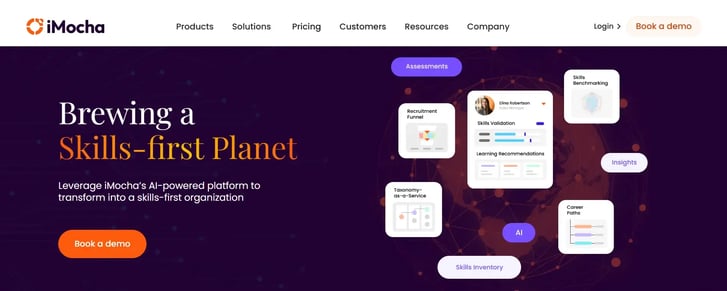 iMocha is a skills intelligence platform that helps companies assess, develop, and manage the skills of their workforce. Their skills audit tool uses various assessment methods, including tests, simulations, and surveys, to provide insights into an individual's skills, knowledge, and abilities.
iMocha is a skills intelligence platform that helps companies assess, develop, and manage the skills of their workforce. Their skills audit tool uses various assessment methods, including tests, simulations, and surveys, to provide insights into an individual's skills, knowledge, and abilities.
- Skill-Gap Analysis: iMocha AI-powered gap analysis helps you identify and analyze discrepancies between current employee skill sets and desired skill levels for their roles or organizational goals.
- Skills Matching: Validate and categorize primary and secondary skills within your workforce. Match individuals' skill sets against business requirements and project demands, ensuring optimal resource allocation and talent utilization.
- Skills Benchmarking: Compare your organization's skill proficiency against industry benchmarks, competitor data, or internal standards.
- Skills Inventory: This platform helps you create your skills inventory, which is crucial for optimizing resource allocation, enhancing customer satisfaction, and fostering employee engagement and development.
Founding Year: 2015
G2 Rating: 4.4/5 (262 Reviews)
Pricing: Checkout the free trial option
|
Stop wasting time and resources on ineffective skills audits. Develop a future-proof skills strategy for your organization with iMocha Skills Intelligence. |
2. Skills Base
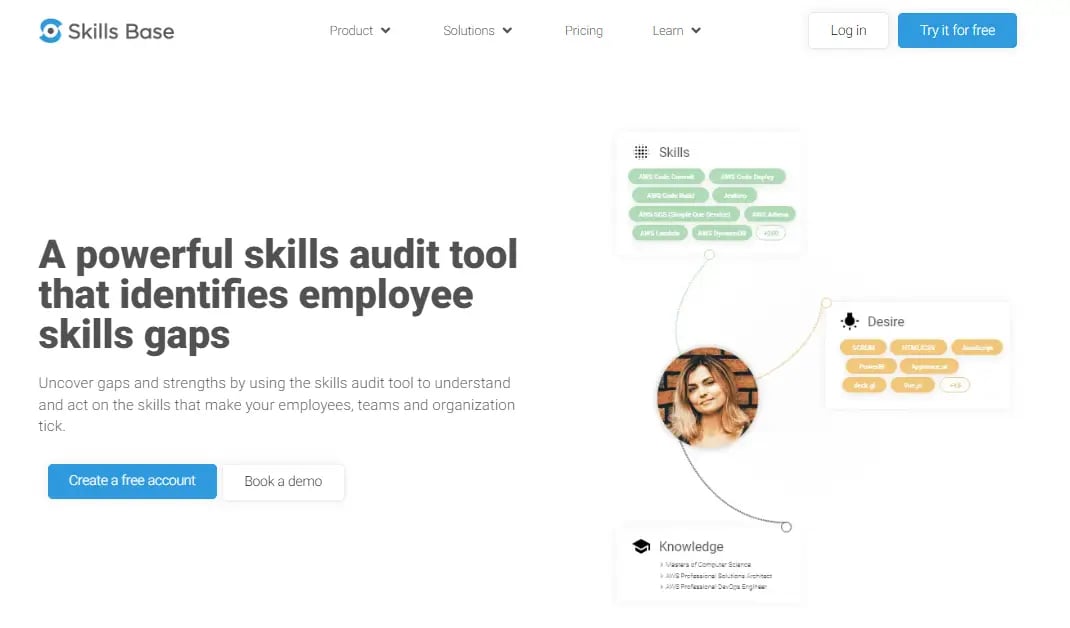 Skills Base is powerful skills audit software designed to help organizations manage and optimize their workforce's skills and knowledge.
Skills Base is powerful skills audit software designed to help organizations manage and optimize their workforce's skills and knowledge.
- Enable Employee Self-Discovery: Skills Base’s assessment tool is a user-friendly platform for self-assessing and tracking skills & interests.
- Centralized System: Skills Base centralizes your skills assessment data, offering in-depth reporting capabilities to identify skill gaps and potential development opportunities. Access insights directly within the platform, export data in various formats (CSV, PDF), or integrate it with your HR system.
- Align Skills with Business Goals: With Skills Base, managers can tailor skill assessments to align with business goals, enabling them to track employee progress, support their success, and measure the impact of training programs on measurable competencies.
Founding Year: 2012
G2 Rating: 4.6/5 (18 Reviews)
Pricing: Starts at $0 for up to 25 users
3. Cognology
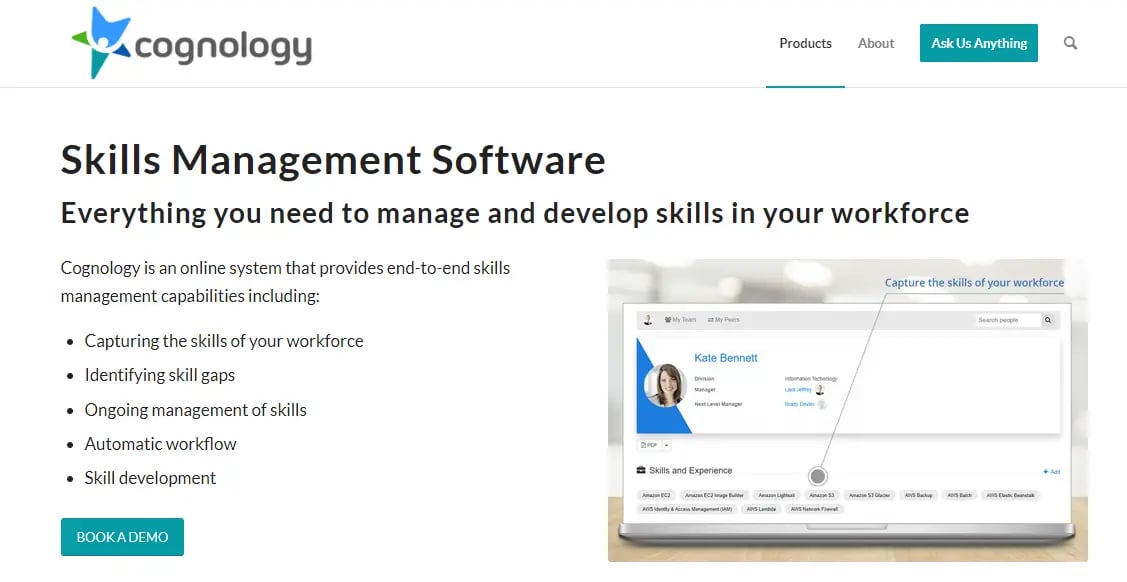 Cognology's Skills Management Software offers comprehensive features for conducting skills audits and effectively managing your workforce's skills.
Cognology's Skills Management Software offers comprehensive features for conducting skills audits and effectively managing your workforce's skills.
- Define and Allocate Skills: You can use the library tool to define skills and get automatic allocation of skills audits based on employee roles.
- Comprehensive Skills Matrix: Cognology visually maps your workforce's skills against predefined criteria. Color-coded insights help you identify areas of expertise and pinpoint skill gaps.
- Automated Reminders: This platform helps employees with automated reminders to ensure their audit process is completed.
- Skills Audit Dashboard: Gain a clear understanding of your employee's strengths and weaknesses with a heat-mapped skills matrix.
Founding Year: 1994
G2 Rating: NA
Pricing: Contact Cognology for Pricing
|
Uncover hidden talent, bridge skill gaps, and build a future-proof workforce with iMocha Skills Intelligence Cloud. |
4. PeopleScout
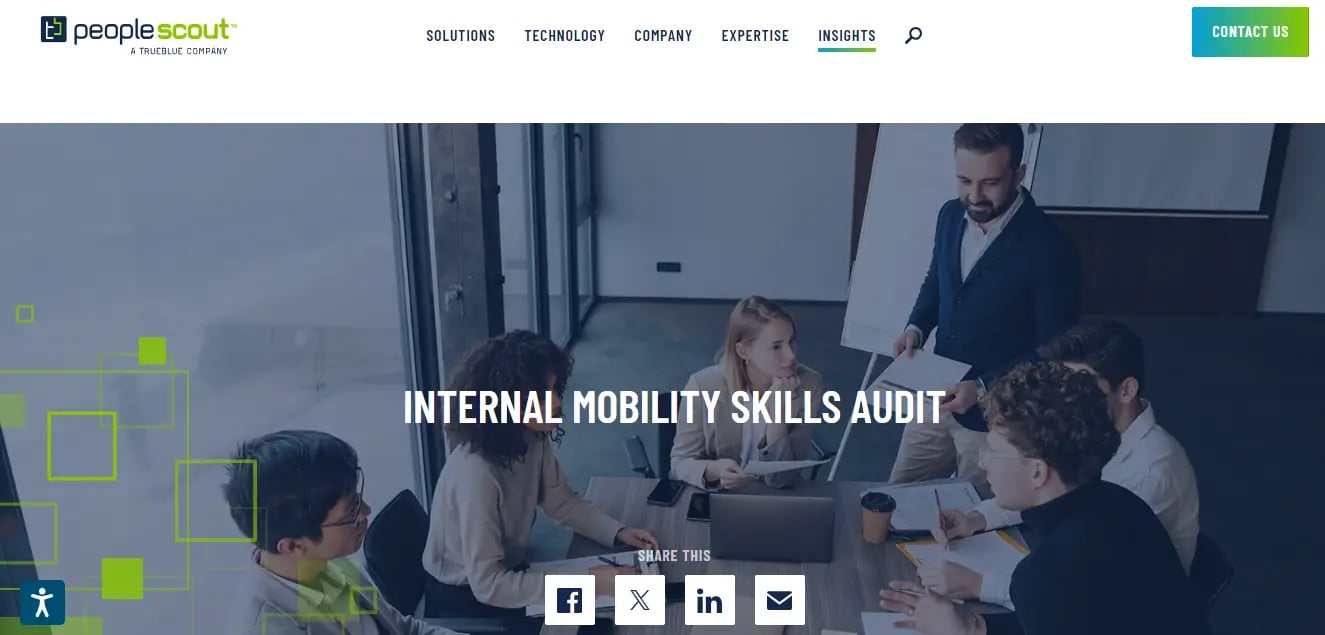 PeopleScout is a large talent management and acquisition firm. Although it’s not a specific skills audits platform, it offers various services and solutions related to skills assessments and gap analysis for businesses.
PeopleScout is a large talent management and acquisition firm. Although it’s not a specific skills audits platform, it offers various services and solutions related to skills assessments and gap analysis for businesses.
- Review Existing Profiles: PeopleScout helps you review current job descriptions to find out what skills are needed.
- Data Analysis: With data analysis, their platform equips you with the insight to see the effect of upcoming organizational changes or future work trends on the roles.
- Identifying Competencies: They help you develop a list of competencies that most clearly and accurately describe what is necessary to do the work.
- Detailed Audit Report: With their services, you can aggregate your audit findings into a report to obtain a clear view of your organization's existing skills and knowledge.
Founding Year: 1992
G2 Rating: NA
Pricing: Contact PeopleScout for Pricing
| Dive into our blog featuring the 'Top 16 Skills Management Software', revolutionizing how you assess and optimize your team's skills for strategic growth. |
5. Clevry
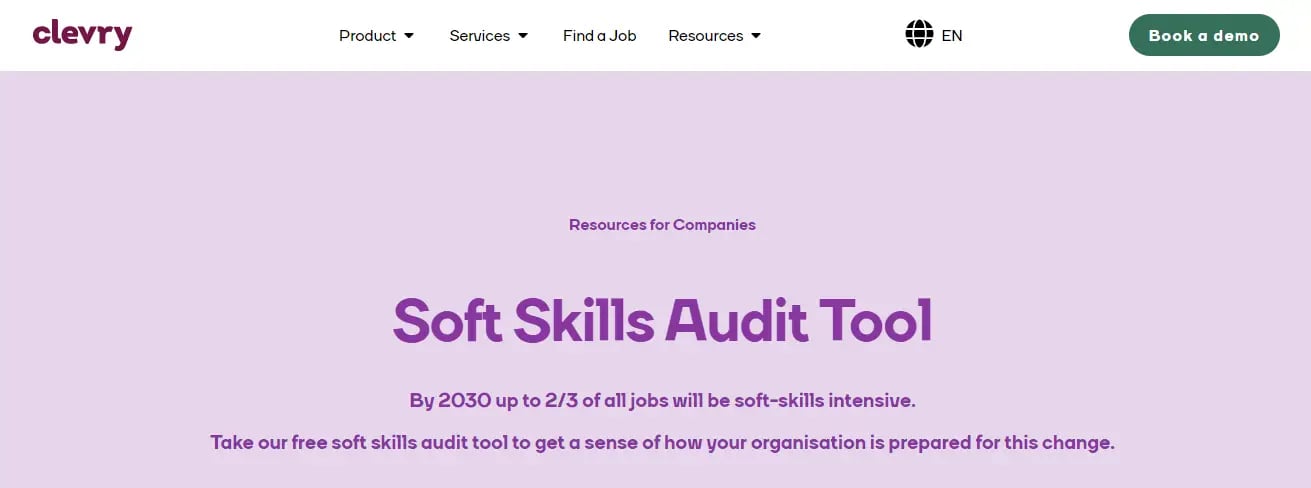 Clevry is a soft skills platform for assessing, hiring, and developing talent. It helps assess the personality, abilities, and motivational drivers of candidates, employees, and management committees.
Clevry is a soft skills platform for assessing, hiring, and developing talent. It helps assess the personality, abilities, and motivational drivers of candidates, employees, and management committees.
- Flexible Assessments: Clevry streamlines assessment creation with various psychometric assessment tools, such as personality questionnaires, ability tests, and situational judgment tests.
- Personalized Evaluation: You can personalize candidate evaluations by selecting from a library of 46 attributes covering different styles, motivations, and cultural fit aspects.
- Advanced Candidate Matching: Clevry's "overall suitability algorithm" helps you with objective candidate matching. The "Selection View" then provides insights into the degree of fit between each candidate and the desired job role's attributes.
Founding Year: 1991
G2 Rating: NA
Pricing: Contact Clevry for Pricing
6. TalentGuard
 TalentGuard is an AI-driven skills and talent intelligence platform built to assess, develop, and manage your workforce skills. Their skills audit capabilities include self and manager validations, LinkedIn profile inference, and ongoing check‑ins for career progression.
TalentGuard is an AI-driven skills and talent intelligence platform built to assess, develop, and manage your workforce skills. Their skills audit capabilities include self and manager validations, LinkedIn profile inference, and ongoing check‑ins for career progression.
- Skill‑Gap Analysis: AI identifies gaps between current and desired skill levels, guiding strategic development.
- Skills Inventory: Create a centralized, dynamic record of employee competencies for planning and development.
- Data‑Driven Decisions: Leverage aggregated analytics for smarter hiring, succession, and talent planning.
Founding Year: 2009
G2 Rating: 4.6/5 (4 reviews)
Pricing: Contact TalentGuard for details
7. Fuel50
 Fuel50 offers a Talent Intelligence Platform anchored by one of the most comprehensive skills ontologies, backed by behavioral science and AI. It supports talent mobility and targeted development.
Fuel50 offers a Talent Intelligence Platform anchored by one of the most comprehensive skills ontologies, backed by behavioral science and AI. It supports talent mobility and targeted development.
- Skills Architecture: Maps and evolves your organization’s role-skills framework for more adaptable workforce planning.
- Skills Inventory & Ontology: Houses over 5,000 AI‑curated capabilities giving structure and depth to your skills taxonomy.
- Talent Marketplace & Insights: Matches employees to projects or roles and delivers actionable talent insights for internal mobility.
- Measurable Results: Drives reduced churn, increased engagement, and enhanced mobility.
Founding Year: 2011
G2 Rating: 4.3/5 (19 reviews)
Pricing: Available via Fuel50 website
9. Degreed
 Degreed is an AI-driven learning experience platform with integrated skills intelligence and analytics for identifying gaps, tracking progress, and personalizing development.
Degreed is an AI-driven learning experience platform with integrated skills intelligence and analytics for identifying gaps, tracking progress, and personalizing development.
- Skill Lifecycle Management: Organizes skill data from tracking to workforce alignment, empowering strategic learning decisions.
- Gap Identification & Learning Paths: Highlights areas for development and aligns personalized learning with business needs.
- Content Integration and Collaboration: Aggregates learning materials from multiple sources and fosters peer learning and feedback loops.
- Analytics & Reporting: Tracks skill trends and training impact for smarter talent investment.
Founding Year: 2012
G2 Rating: 4.3/5 (42 reviews)
Pricing: Contact Degreed
9. Skillrobo
 Skillrobo is a cloud‑based skill assessment and audit tool tailored for recruiting and internal capability measurement, offering customization and automation.
Skillrobo is a cloud‑based skill assessment and audit tool tailored for recruiting and internal capability measurement, offering customization and automation.
- Custom Assessments: Build role‑specific, AI‑enhanced tests using an extensive pre-built library or create your own.
- Secure and Scalable: Designed for enterprise usage with proctoring, customizable logic, and system integrations.
- Real‑Time Analytics: Get immediate insights, candidate comparisons, and detailed performance metrics.
- Hiring Efficiency: Reduces bias and accelerates onboarding with objective, data-backed testing.
Founding Year: 2011
G2 Rating: 4.8/5 (3 reviews)
Pricing: Offers a free trial; contact for full pricing
10.SkillsDB
SkillsDB is a learning and development platform focused on closing skill gaps through competency-based training and upskilling frameworks.
- Competency-Based Training: Delivers targeted programs that align workforce skills with development outcomes.
- Skills Profile Management: Supports self-assessments and skills tracking to capture employee capabilities over time.
- Growth-Focused Analytics: Translates audit results into actionable development plans and career progress mapping.
Founding Year: 2008
G2 Rating: Not available
Pricing: Contact SkillsDB for details
| Check out our list of the top 10 skills gap analysis tools that enhance skills audits and reveal critical workforce development needs. |
Final Thoughts
Skills audits are crucial for companies to identify skill gaps, optimize training, and boost employee performance. However, choosing the right skills audit tool to streamline the process is even more important. Skill Intelligence platforms are becoming mainstream when it comes to skills-based talent management initiatives like skills audits.
iMocha’s Skill Intelligence cloud streamlines and automates your skills audit process. From sourcing the data to skills gap analysis and benchmarking, it goes one step further to map the identified skills into their built-in ontology and taxonomy. To help you keep up with the skills of your workforce, it generates granular audit reports that help you maximize your existing workforce’s potential or hire for specific skills, ultimately building a future-ready workforce.
Also, dive into our blog on the top 11 skills matrix tools to enhance audit processes, identify gaps, and guide reskilling initiatives.
|
Bridge the skill-gap with iMocha Skills Intelligence. |
FAQs
What does the Skills Audit Tool do?
These tools assess your employees' skills and knowledge, helping you identify strengths, weaknesses, and potential gaps. This information is used to develop targeted training, optimize resource allocation, and improve overall performance.
What skills can be measured in Skills Audit Tools?
Skills audits typically assess a range of hard and soft skills, including:
- Technical skills: Programming languages, software knowledge, industry-specific expertise, data analysis.
- Communication skills: Written and verbal communication, presentation, active listening, negotiation.
- Problem-solving skills: Critical thinking, analytical skills, decision-making, ability to find solutions.
- Interpersonal skills: Teamwork, collaboration, leadership, conflict resolution, empathy.
- Organizational skills: Time management, project management, attention to detail, ability to prioritize tasks.
What features should I look for in a skills audit tool?
When evaluating these tools, consider these must-have features:
-
Extensive Skills Coverage: Ensure the platform includes a wide library of validated technical, domain-specific, and soft skills assessments.
-
Skills Taxonomy & Ontology: Look for tools that can map skills to job roles using structured taxonomies and ontologies. This enables deeper insights into current capabilities and future needs.
-
AI-Driven Skill Profiling: Choose a tool that automatically builds and updates employee skill profiles using data from assessments, learning systems, and performance tools.
-
Multi-Source Validation: A robust system should validate skills through self-assessments, manager reviews, AI inference, and practical evaluations.
-
Real-Time Gap Analysis: The tool should identify critical skill gaps and suggest targeted learning paths, enabling informed decisions around upskilling and talent deployment.
-
Career Path Mapping: Look for the ability to surface adjacent skills and recommend personalized career development options based on current strengths.
-
Actionable Analytics: Insights should include dashboards for workforce planning, training ROI, internal mobility, and performance alignment.
-
Integration Capabilities: Opt for tools that easily connect with your existing HR tech stack, like ATS, LMS, and performance systems.
|
|

